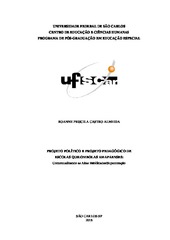| dc.contributor.author | Almeida, Roanne Priscila Castro | |
| dc.date.accessioned | 2019-08-09T13:08:51Z | |
| dc.date.available | 2019-08-09T13:08:51Z | |
| dc.date.issued | 2018-12-13 | |
| dc.identifier.citation | ALMEIDA, Roanne Priscila Castro. Projeto político e projeto pedagógico de escolas quilombolas amapaenses: contextualizando as altas habilidades/superdotação. 2018. Dissertação (Mestrado em Educação Especial) – Universidade Federal de São Carlos, São Carlos, 2018. Disponível em: https://repositorio.ufscar.br/handle/ufscar/11674. | * |
| dc.identifier.uri | https://repositorio.ufscar.br/handle/ufscar/11674 | |
| dc.description.abstract | There are people with giftedness in any population regardless the condition. However, they need to be identified and strengthened with services that enrich and favor their development process, respecting their cultural identity. There is a discrepancy regarding the schooling of the black population compared to the white Brazilian population at any level of education as well as the target public of Special Education, specifically gifted students. It is believed that through school actions it will be possible to achieve a social transformation with equity. In this way, the school should have as a guiding principle visible actions in its Political Pedagogical Project (PPP) and interventions by Pedagogical Projects (PP). In this perspective, we aimed to analyze the PPPs and PPs of two Quilombolas schools in Amapá in order to verify if they contemplate giftedness. And as specific goals: understanding the scenario of Quilombola education in the state of Amapá; analyzing the context of the schools studied, based on their PPPs and PPs; verifying which area(s) of giftedness are more explicit in the PPs of the schools surveyed; expanding the discussion of Giftedness with indications for identification, through projects of the provision and enrichment. The research was qualitative documental with a multiple case study. The results pointed out: i) the state of Amapá had 21 Quilombola schools and 1,955 students; ii) in Amapá, in the year 2017, there were 271 enrollments of students with giftedness; iii) the school PPPs indicated weaknesses in Special Education, as they did not even mention students with giftedness as a public to be considered by the school; giving emphasis to the limitations of the students; iv) the projects of both schools presented goals that favored the students, but it was verified that the identification could be done through the provision, as well as for the curricular enrichment as a form of supplementation, both as possible means to combat the existent educational problems in the school institutions. The analysis of the two schools made it possible to understand that there is an exclusion of students with giftedness in Amapá, with more prominence in Quilombolas schools. | eng |
| dc.description.sponsorship | Não recebi financiamento | por |
| dc.language.iso | por | por |
| dc.publisher | Universidade Federal de São Carlos | por |
| dc.rights.uri | Acesso aberto | por |
| dc.subject | Educação Especial | por |
| dc.subject | Altas habilidades/superdotação | por |
| dc.subject | Escolas quilombolas | por |
| dc.subject | Projeto Político Pedagógico | por |
| dc.subject | Special Education | eng |
| dc.subject | Giftedness | eng |
| dc.subject | Quilombolas schools | eng |
| dc.subject | Political Pedagogical Project | eng |
| dc.title | Projeto político e projeto pedagógico de escolas quilombolas amapaenses: contextualizando as altas habilidades/superdotação | por |
| dc.title.alternative | Political project and pedagogical project of amapaenses quilombolas schools: contextualizing the high skills / giftedness | eng |
| dc.type | Dissertação | por |
| dc.contributor.advisor1 | Rangni, Rosemeire de Araújo | |
| dc.contributor.advisor1Lattes | http://lattes.cnpq.br/6399149504309769 | por |
| dc.description.resumo | As pessoas com altas habilidades/superdotação (AH/SD) existem em qualquer população, independentemente de suas condições. Entretanto, elas precisam ser identificadas e potencializadas com atendimentos que enriqueçam e favoreçam seu processo de desenvolvimento, respeitando sua identidade cultural. Registra-se a discrepância quanto à escolaridade da população negra comparada à população branca brasileira em qualquer nível de ensino, bem como da pessoa público-alvo da Educação Especial, especificamente alunos com AH/SD e acredita-se, que por meio das ações escolares será possível a realização de uma transformação social com equidade. Dessa forma, a escola deve ter como princípio ações norteadoras visibilizadas em seu Projeto Político Pedagógico (PPP) e intervenções por projetos pedagógicos (PP). Nessa perspectiva, o objetivo geral da pesquisa foi analisar os PPPs e PPs de duas escolas quilombolas amapaenses com vista a verificar se contemplam as altas habilidades/superdotação. Como objetivos específicos: conhecer o panorama da educação quilombola no Estado do Amapá; analisar o contexto das escolas pesquisadas, embasando-se em seus PPPs e PPs; verificar em que área(s) das AH/SD é (são) mais explícitos nos PPs das escolas pesquisadas; e ampliar a discussão das AH/SD com indicações para a identificação, por meio da provisão e o enriquecimento dos projetos. Desenhou-se uma pesquisa qualitativa documental primária com um estudo de caso múltiplo. Os resultados apontaram: i) o estado do Amapá contava com 21 escolas quilombolas e 1.955 estudantes; ii) no Amapá, no ano de 2017, havia 271 matrículas de alunos com AH/SD; iii) os PPPs das escolas apontaram fragilidades no âmbito da Educação Especial, pois sequer mencionaram os alunos com AH/SD como público a ser considerado pela escola; dando ênfase às limitações dos alunos; iv) os projetos de ambas as escolas apresentaram metas favorecedoras aos alunos, mas verificou-se que a identificação poderia ser realizada por meio da provisão, bem como o enriquecimento curricular poderia ser adotado como forma de suplementação, ambos como possíveis meios para combater os problemas educacionais existentes nas duas instituições escolares. As análises das duas escolas propiciaram entender que há uma exclusão dos alunos com AH/SD no Amapá, com mais destaque nas escolas quilombolas. | por |
| dc.publisher.initials | UFSCar | por |
| dc.publisher.program | Programa de Pós-Graduação em Educação Especial - PPGEEs | por |
| dc.subject.cnpq | CIENCIAS HUMANAS::EDUCACAO::TOPICOS ESPECIFICOS DE EDUCACAO | por |
| dc.ufscar.embargo | Online | por |
| dc.publisher.address | Câmpus São Carlos | por |
| dc.contributor.authorlattes | http://lattes.cnpq.br/4227399058331918 | por |
